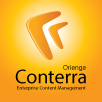Orienge Case Study. Contract Management
Company Summary
The client company is one of more than 30 branches and the biggest oil extraction company of an international petroleum holding. The company has over 7,000 employees, including about 200 specialists working in the headquarters and using the Enterprise Content Management system.
Challenges
The project was aimed at automating contract approval processes.
To be reviewed and approved by CEO, a contract (its printed copy) had to go first through 8 to 12 departments, located in three different city districts, and collect the required signatures on its “read and understood” page. So, on average, the approval process lasted for about 45 days per one contract. The same went for invoices and deeds approval. With about 5,000 new contracts per year, the existing procedure caused multiple harmful effects such as negative business image, inability to locate the required contractual document, document losses, different fines and penalties, a significant increase in the total cost of ownership for the process, etc.
Solution
To overcome the existing problems, a good Enterprise Content Management system was needed. Having analyzed and compared four different ECM systems the company chose the solution with the richest functionality for a better price. Another important factor taken into account was the agility of the system, as the company planned to retain the core logic of the existing business processes.
The project included creating electronic contracts archive, regulating contracts registration, as well as automating approval and other contract-related processes. The professional implementation strategy was applied, so the ECM system was configured according to specific customer’s requirements and implemented by the integrator’s employees.
To simplify the solution configuration, different process roles were created, which allowed system administrators to easily appoint employees for various approval actions. According to the company’s business processes, four standard routes for approving various contractual documents were configured. From that moment users did not have to know the exact person to approve the contract: all they had to do was to select the required standard route and leave the rest to the ECM system. The responsibility matrix, elaborated to comply with the company’s internal regulations, ensured correct approvers selection.
As one of the company’s requirements was having detailed and structured information on contracts, 37 databooks and dictionaries of diverse complexity were developed in addition to the existing ones. Electronic contract card was equipped with multiple attributes, which substantially simplified the processes of preparing orders and approval forms, gathering statistics, searching for contracts and controlling their processing. A variety of new reports allowed users to collect and analyze all sorts of information on contracts from different databooks. The approval forms with information on contract conditions, approvers, time of approval and digital signing were now generated automatically.
In cooperation with SAP specialists, the ECM system was integrated with SAP R/3 and SAP HR solutions, which enabled data interchange between the systems.
Results
Prior to the pilot operation stage, corporate contracts archive had been created; and the process of contracts creation, registration and approval had been launched.
Contract automation has been a success. All departments involved in the process now work in the Enterprise Content Management system, approving contracts and the related documents electronically. Printed copies are no longer sent from one office to another. Risks of document loss have been eliminated. The approval process has been accelerated by 37% and more: 28 days approval (compared to the initial 45 days) is now an absolute maximum. Transparent workflow and enhanced supervision possibilities ensure timely contract commitments fulfillment; thus guaranteeing against fines and penalties, and improving the business image of the company. The ultimate total cost of ownership for the contract approval process has dropped.
The solution has been certified as a template for future replication in all extracting companies of the holding. The replication is in the process. The solution functionality is planned to be expanded, to ensure automatic expenditure controlling and limiting.

